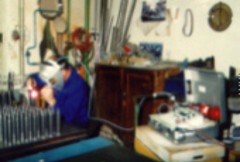- Missions of the IFA
- Fields of activity
- Organisation
- How to find us - Address - E-Mail
- Impressum
Exposure to Hazardous Substances - Measurement Techniques and Assessment

Ozone measurement at a welding workplace, Source: IFA
The section "Exposure to Hazardous Substances - Measurement Techniques and Assessment" of the department Hazardous Substances: Handling - Protective Measures explores the following questions:
-
Hazardous substance measurement
The technical measuring services of the Social Accident Insurance Institutions are supported by the laboratory of measuring equipment maintained by IFA. It provides sampling devices and direct reading measuring devices for hazardous substances. The measurement engineers are advised and trained as to the possible uses of the devices. As needed, hazardous substance measurement are conducted by the unit and suggestions are made for the required protective and preventive measures. -
Aerosol measurement techniques and technology
Personal and stationary sampling devices in part designed (PDF, 96 kB, non-accessible) by IFA - are used to determine airborne dust concentrations at workplaces. IFA cooperates closely with international institutions in providing these services. On demand, the unit also conducts ultrafine particle measurements (PDF, 117 kB, non-accessible) . As an acknowledged instrument testing body, IFA tests dust sampling devices and pumps for conformity with the applying standards and norms. -
Simplifying the monitoring duty
The unit is also home to the working group "Empfehlungen Gefährdunsermittlung der Unfallversicherungsträger" (EGU), formerly known as "BG/BGIA recommendations for monitoring work spaces". EGU recommendations (PDF, 471 kB, non-accessible) are industry solutions in terms of the TRGS 420, "Determining and assessing the hazards caused by hazardous substances at the workplace: Procedures (monitoring duties)". These recommendations provide enterprises with "instructions ready for use" for determining or monitoring hazardous substances and devising the required protective measures. There are thus BG/BGIA recommendations for using Cu-HDO-containing wood protection agents, for the fields of publication gravure, flour dust in bakeries and motor vehicle inspections in inspection firms. -
Occupational disease procedures
Social Accident Insurance Institutions are supported in the adjudication of occupational disease cases with hazardous substance measurements in companies, calculated exposure estimates or simulations of work processes. -
Re-enacted studies of work processes
Studies are conducted in a testing chamber fitted with technical room air equipment. A more expansive measurement procedure can be realised here under defined environmental conditions so as to measure exposure emanating from individual machines or steps in the work process or the entire work process itself. -
Substitute substance testing
Technically similar dust-producing products are studied to determine their dustiness.
Further reading from IFA
Contact
Dr Renate Beisser
Fax: +49 30 13001-38001
Email
Hazardous substances: handling, protective measures
Tel: +49 30 13001-3310Fax: +49 30 13001-38001